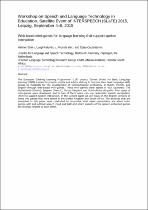JavaScript is disabled for your browser. Some features of this site may not work without it.
- ResearchSpace
- →
- Research Publications/Outputs
- →
- Conference Publications
- →
- View Item
| dc.contributor.author |
Strik, H

|
|
| dc.contributor.author |
Palumbo, L

|
|
| dc.contributor.author |
De Wet, Febe

|
|
| dc.contributor.author |
Cucchiarini, C

|
|
| dc.date.accessioned | 2016-05-16T10:21:15Z | |
| dc.date.available | 2016-05-16T10:21:15Z | |
| dc.date.issued | 2015-09 | |
| dc.identifier.citation | Strik, H, Palumbo, L, de Wet, F and Cucchiarini, C. 2015. Web-based mini-games for language learning that support spoken interaction. In: Workshop on Speech and Language Technology in Education, Satellite Event of INTERSPEECH (SLaTE) 2015, Leipzig, September 4–5, 2015, 137-142 | en_US |
| dc.identifier.uri | https://www.slate2015.org/files/submissions/Strik15-WMF.pdf | |
| dc.identifier.uri | http://hdl.handle.net/10204/8545 | |
| dc.description | Workshop on Speech and Language Technology in Education, Satellite Event of INTERSPEECH (SLaTE) 2015, Leipzig, September 4–5, 2015, 137-142.Due to copyright restrictions, the attached PDF file only contains the abstract of the full text item. For access to the full text item, please consult the publisher's website | en_US |
| dc.description.abstract | The European ‘Lifelong Learning Programme’ (LLP) project ‘Games Online for Basic Language learning’ (GOBL) aimed to provide youths and adults wishing to improve their basic language skills access to materials for the development of communicative proficiency in Dutch, French, and English through web-based mini-games. These mini-games were tested in four countries: The Netherlands (Dutch), Belgium (French), United Kingdom and South-Africa (English). Four types of mini-games were developed, and in two of them users can use ‘automatic speech recognition’ (ASR) to support spoken interaction. In the current paper we will focus on the English versions of these two games that were tested in the United Kingdom and South-Africa. The analyses that are presented in this paper were conducted to determine what users’ perceptions are about mini-games with and without speech input and ASR and which aspects of the speech-enhanced games are strongly related to each other. | en_US |
| dc.language.iso | en | en_US |
| dc.publisher | International Speech Communication Association | en_US |
| dc.relation.ispartofseries | Workflow;15697 | |
| dc.subject | Second language learning | en_US |
| dc.subject | Language technology | en_US |
| dc.subject | Speech technology | en_US |
| dc.subject | Speaking practice | en_US |
| dc.title | Web-based mini-games for language learning that support spoken interaction | en_US |
| dc.type | Conference Presentation | en_US |
| dc.identifier.apacitation | Strik, H., Palumbo, L., De Wet, F., & Cucchiarini, C. (2015). Web-based mini-games for language learning that support spoken interaction. International Speech Communication Association. http://hdl.handle.net/10204/8545 | en_ZA |
| dc.identifier.chicagocitation | Strik, H, L Palumbo, Febe De Wet, and C Cucchiarini. "Web-based mini-games for language learning that support spoken interaction." (2015): http://hdl.handle.net/10204/8545 | en_ZA |
| dc.identifier.vancouvercitation | Strik H, Palumbo L, De Wet F, Cucchiarini C, Web-based mini-games for language learning that support spoken interaction; International Speech Communication Association; 2015. http://hdl.handle.net/10204/8545 . | en_ZA |
| dc.identifier.ris | TY - Conference Presentation AU - Strik, H AU - Palumbo, L AU - De Wet, Febe AU - Cucchiarini, C AB - The European ‘Lifelong Learning Programme’ (LLP) project ‘Games Online for Basic Language learning’ (GOBL) aimed to provide youths and adults wishing to improve their basic language skills access to materials for the development of communicative proficiency in Dutch, French, and English through web-based mini-games. These mini-games were tested in four countries: The Netherlands (Dutch), Belgium (French), United Kingdom and South-Africa (English). Four types of mini-games were developed, and in two of them users can use ‘automatic speech recognition’ (ASR) to support spoken interaction. In the current paper we will focus on the English versions of these two games that were tested in the United Kingdom and South-Africa. The analyses that are presented in this paper were conducted to determine what users’ perceptions are about mini-games with and without speech input and ASR and which aspects of the speech-enhanced games are strongly related to each other. DA - 2015-09 DB - ResearchSpace DP - CSIR KW - Second language learning KW - Language technology KW - Speech technology KW - Speaking practice LK - https://researchspace.csir.co.za PY - 2015 T1 - Web-based mini-games for language learning that support spoken interaction TI - Web-based mini-games for language learning that support spoken interaction UR - http://hdl.handle.net/10204/8545 ER - | en_ZA |






